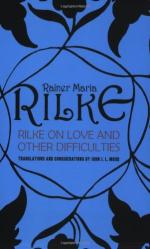
|
| Name: _________________________ | Period: ___________________ |
This test consists of 15 multiple choice questions and 5 short answer questions.
Multiple Choice Questions
1. Rilke says in "The Dragon-Princess," that "the experiences called 'visions,' the whole so-called 'spirit world'," etc. has been so crowded out of life that the "sense we could have grasped them with has" done what?
(a) Melted.
(b) Diminished.
(c) Atrophied.
(d) Collapsed.
2. On what word does Mood focus in examining the ambiguity of "The Dragon-Princess"?
(a) Perhaps.
(b) Maybe.
(c) Until.
(d) Hope.
3. What would one feel, displaced from one's room and set in a place of great solitude?
(a) Abiding love.
(b) Great bravery.
(c) Unparalleled insecurity.
(d) Great fear.
4. In what town is Rilke buried?
(a) Raron.
(b) Berlin.
(c) London.
(d) Paris.
5. What does Rilke suggest we do to the possible dangers at hand in life?
(a) Try to love them.
(b) Conquer them.
(c) Arrest them.
(d) Run from them.
6. Which poem of Rilke's does Mood refer to in the lines, "And this: that one opens like a lid, / and lying under there nothing but eyelids"?
(a) "The Rose Window."
(b) "The Lovers."
(c) "The Bowl of Roses."
(d) "Greek Love-Talk."
7. What does Rilke write that verses are in "Blood-Remembering"?
(a) Memories.
(b) Love.
(c) Feelings.
(d) Experiences.
8. In "Blood-Remembering," Rilke writes "One must be able to think back to roads in ________."
(a) Days of yore.
(b) Unknown regions.
(c) Childhood memory.
(d) Remote lands.
9. In what year did Rilke write his own epitaph?
(a) 1915.
(b) 1921.
(c) 1925.
(d) 1927.
10. In "The Dragon-Princess," Rilke suggests that we hold our life to the most difficult, and that which now "still seems to us the most alien will become" what?
(a) What we most trust.
(b) What frees us.
(c) What blinds us.
(d) What kills us.
11. Of what does Rilke write "that so strangely began with such a number of profound and grave transformation" in "Blood-Remembering"?
(a) Of painful thoughts.
(b) Of depressions.
(c) Of lost loves.
(d) Of childhood illnesses.
12. From what work of Norman O. Brown's does Mood quote from in the Epilogue?
(a) Restless Eternity.
(b) Love's Body.
(c) Lord and Lady.
(d) End of Time.
13. Who insisted on placing a large cross on a separate tombstone for Rilke?
(a) His grandson.
(b) His son.
(c) His daughter.
(d) His wife.
14. What does Rilke refer to death as?
(a) The other side of life.
(b) The killer of children.
(c) The lover's quarrel.
(d) The sleeping beast.
15. What does Rilke write of "screams of women" in "Blood-Remembering"?
(a) In labor.
(b) In regret.
(c) In heartbreak.
(d) In sorrow.
Short Answer Questions
1. Speaking of solitude, Rilke writes, "We are solitary. We may _____ ourselves and act as though this were not so."
2. Who does the commentator conclude that Rilke's epitaph addresses?
3. In "The Dragon-Princess," Rilke writes that the feeling one might have placed in total isolation, is "an abandonment to something inexpressible would almost ______ him."
4. How much earlier than his death did Rilke pen his epitaph?
5. Rilke writes in "Blood-Remembering" that quite at the end of life, one might be able to write how many verses that were good?
|
This section contains 466 words (approx. 2 pages at 300 words per page) |

|




